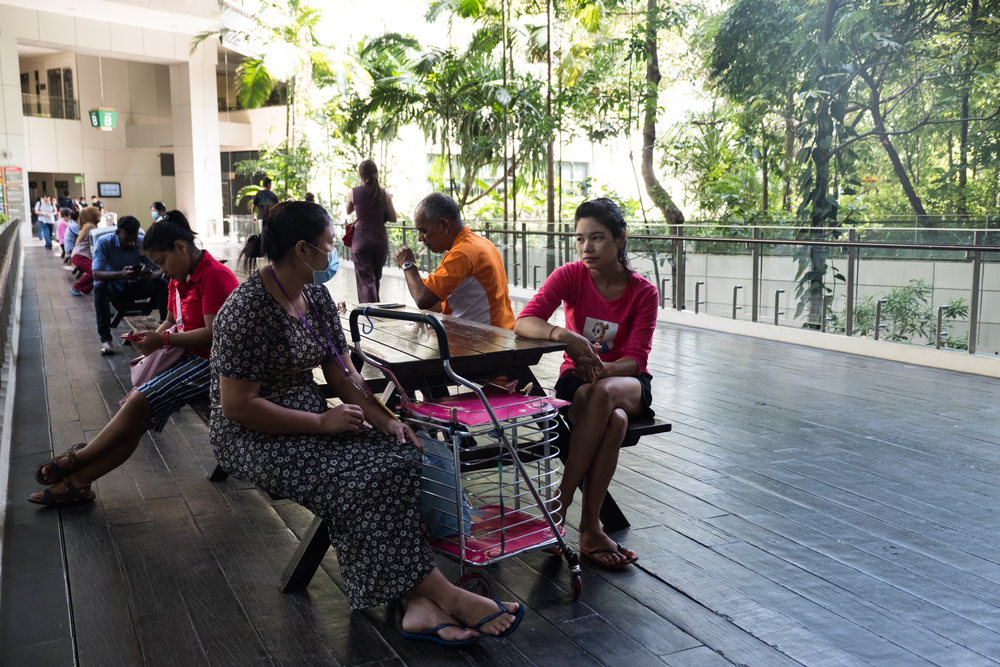The recent online and public conversations by nurses regarding the disparity in remuneration of someone with no healthcare background—being paid between $3,400 and $3,800 to perform nasal swabbing—is unusual.
As a Registered Nurse (RN) in Singapore, I would like to take this opportunity to put the issue of remuneration in perspective, and hope that it will provide the public and others with a better understanding of the root of the anger and disappointment of nurses.
I had the privilege of being a part of SG Healthcare Corp where I had the opportunity to train lay volunteers in PPE and 3M Mask Fitting. To those volunteers who had stepped forward to assist in the national effort to do this work, you have my utmost respect and admiration.
Please know that the discussion about remuneration is not aimed at you, but it is an important conversation that must be had about the value of work and fair remuneration within my profession and with policymakers.
The unhappiness is not solely about money; rather, the inequity is seen as an indicator of how our work is valued (or devalued).
The predicament that nurses find themselves in today is also of our making. We must be honest about this too. Let me give an example of this.

What took me by surprise was the number of foreign domestic workers (FDWs) sitting beside the patients and the extent of the care they provided to their charges.
Care that was once the purview of nurses’ work such as turning, toileting/bed-bath, nasogastric tube feeding, changing a patient when a patient is soiled were now being performed by a FDW, who in most instances, probably did not have a healthcare training or background.
This is the beginning of the slippery slope of the devaluation of our professional care work. In doing so, we told everyone that the work we have been trained for, and have been doing, could easily be done by someone else with little or no formal health training and knowledge and for a lower remuneration.
The shift has also given rise to three groups of vulnerable persons—the person being cared for at home who generally may not be able to advocate for himself/herself, the FDW caring for this person, and the family.
Each experiences different levels of anxieties arising from being vulnerable. In addition, safety is an issue as caregiver training ranges from 3-10 hours.
When we offloaded our care work, did we stop and think of the implications of our actions? Were nurses part of the conversation in the transfer of care to FDWs? Were other options explored before we embarked on this slippery slope of offloading our care work on others?
These are the hard questions that nurses must ask of themselves. We must take responsibility for these missteps in order to avoid them in the future.
Perhaps the offloading was done to contain the costs of home care so that families would not be inordinately burdened by the financial costs. However, I believe this could have been addressed by expanding and subsidising the national home-care services earlier and training more nurses to provide home care instead of putting so many resources in acute care.
We need this internal moral compass to remind us why we embarked on this profession.
I also believe that it would not have been difficult to persuade nurses to offload the care work described above because in reality nurses themselves do not see this type of care work as valuable.
The advent or use of technology has led many nurses to think that basic care is something they need not do and thus relegate them to others. We see this in hospitals today.
Yet we know that it is the human touch that is so essential when someone is ill—we all want someone to assure us and be with us when we are at the most vulnerable and lowest point of our health.
Perhaps this is why nurses working in Intermediate and Long-Term Care settings are paid lower than those in acute care. We continue to devalue that type of work because it is devoid of advanced technological interventions.
What we fail to realise is that caring for older persons is far more complex and requires excellent nursing competency and knowledge.
This is not the place to have an in-depth discussion of the state of nursing in Singapore. We know that our nursing culture is transient and fractured.
When I ask nurses (both students and practising nurses) over the years and even now, what it means to be a nurse in Singapore, or what is a nurse, or what are our philosophical values, I get bewildered looks. We don’t know what our nursing culture is.
Our nurses don’t contemplate these questions. If we are unable to articulate what our fundamental values are, then how can we articulate what our profession stands for and what we value?
If we can’t do this, then how can we encourage nurses coming from other countries, with different values, beliefs, cultural backgrounds, and competencies to have a common vision?

One example is the indiscriminate use of the title “nurse” by commercial entities to market their care services. The other reason is the confusing hierarchies that have emerged as a result of unorganised career opportunities.
However, I am reassured that all is not lost for nurses. There are dedicated and passionate nurses who want to bring about change and make this profession worthy of consideration. We need to support them even when they say things that make us uncomfortable. We need this internal moral compass to remind us why we embarked on this profession.
We must continue to have critical conversations about our profession with all concerned, in particular healthcare policymakers. The most important factor in these conversations is that the change that we, as nurses, wish to see must come from us. We have to be involved. We should be the drivers of change. That includes the negotiation for fair remuneration and re-instilling respect and value for our work.






